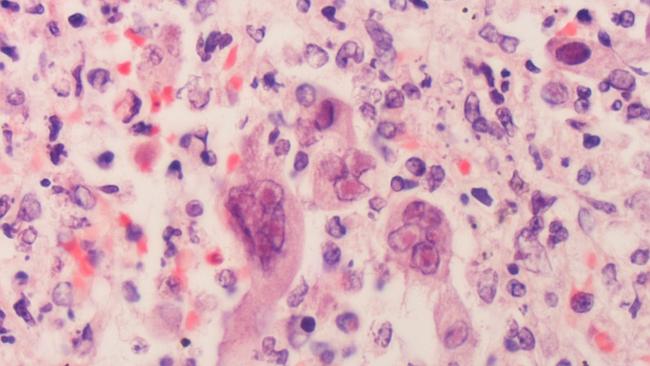
The herpes virus has been harnessed for a workable treatment for skin cancer. Source: Flickr
SCIENTISTS have achieved the first proof that genetically modified viruses can be used to effectively treat cancer in what has been hailed as a major breakthrough.
Researchers used a modified herpes virus to successfully treat patients with aggressive skin cancer and believe the method could pave the way for a new generation of cancer treatments.
The technique is called virotherapy and uses biotechnology to convert viruses into therapeutic agents, effectively allowing them to go on seek and destroy missions in sick patients.
“This is the big promise of this treatment,” said Dr Kevin Harrington, professor of biological cancer therapies at the Institute of Cancer Research London (ICR), who headed the trials. “It’s the first time a virotherapy has been shown to be successful in a phase 3 trial,” he said.
The herpes-based drug is called T-VEC and has already been sent to the US Food and Drug Administration and the European Medical Agency for approval and researchers hope it will be available for consumers as early as next year.
According to a statement from the ICR, T-VEC works by multiplying inside cancer cells and bursting them from within. It can’t be replicated in healthy cells and is designed to produce a molecule which stimulates the immune system to attack and destroy the tumour.

Dr Kevin Harrington headed up the research. Source: YouTube
The study was is published in the Journal of Clinical Oncology and included 436 patients, all of whom had aggressive malignant melanoma. Over 16 per cent of patients responded positively to the drug after more than six months, compared to 2.1 per cent who were given a control treatment.
About 10 per cent of the patients treated experienced a complete remission.
“Our study showed that T-VEC can deliver a significant, durable benefit for people with melanoma,” said Dr Harrington.
Professor Paul Workman, Chief Executive of the ICR, said in a statement, “we may normally think of viruses as the enemies of mankind, but it’s their very ability to specifically infect and kill human cells that can make them such promising cancer treatments.
Australian has one of the highest rates of skin cancer in the world and according to the Cancer Council, two in three Australians will be diagnosed with skin cancer by the time they are 70.
While the trials have provided great optimism in regards to future cancer treatments, the successful results have yet to be replicated.
The Australian Cancer Research Foundation refrained from commenting on the story and are waiting for more clinical trials to be done in the field of virotherapy and cancer.
However Dr Hayley Frend, science information manager at Cancer Research UK said she was excited by the results.
“Using a virus to both kill cancer cells and nudge the immune system into attacking them is exciting,” she said. While previous testing has shown benefits of such treatments, “this is the first study to prove an increase in survival,” said Dr Frend.

The very thing T-VEC is designed to kill. Source: YouTube
Originally published as Herpes used in cancer treatment
